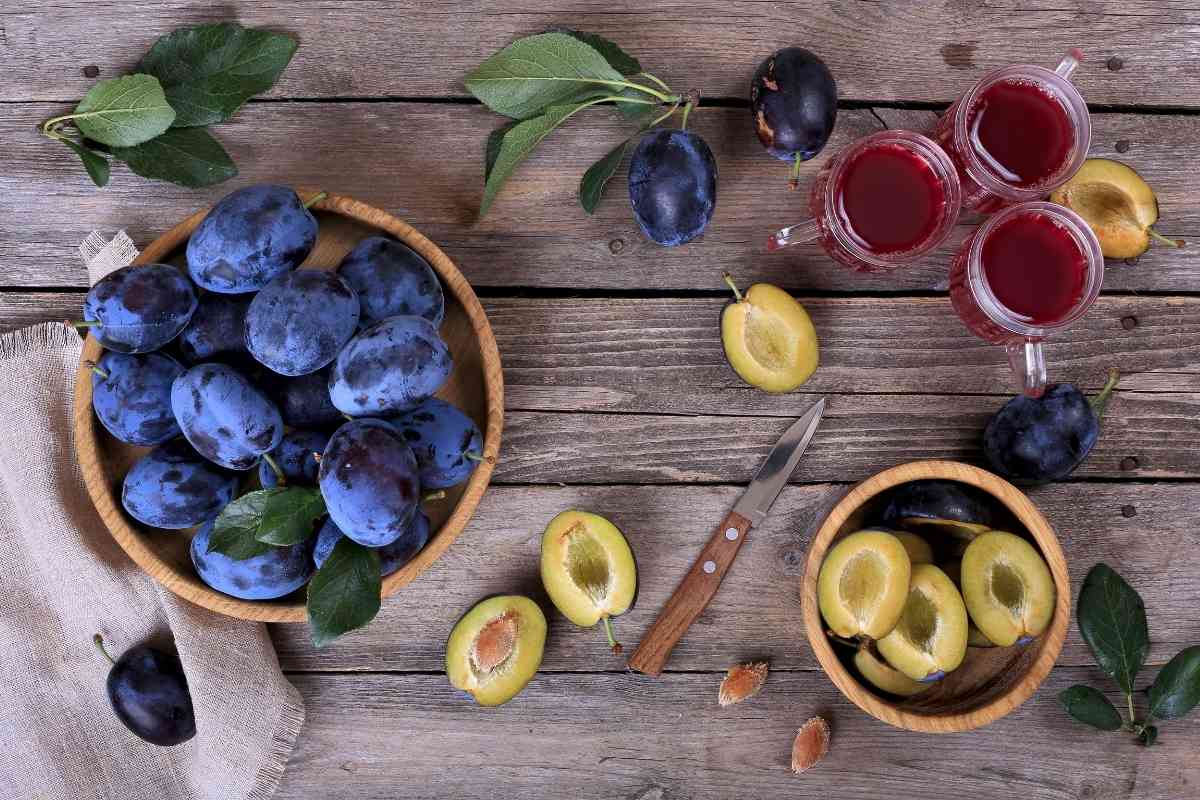Can Puppies Eat Plums? SHOULD Puppies Eat Plums?
Plums are a nutritious fruit that can fit well into a healthy human diet, but you might be wondering if puppies can eat plums. If you have a puppy, you probably want to give it the best food you can during its formative years. Though fruits like plums can be healthy for humans, you have to be careful when feeding these treats to your pet.

Can Puppies Eat Plums?
Puppies can eat plums as long as the pit, stem, and leaves are completely removed. The flesh of a plum is the only part a puppy can safely eat. Since plums contain a fair amount of sugar, they should be fed to puppies in moderation.
Plums contain a variety of vitamins and minerals that can be beneficial for puppies, but they don’t contain enough overall nutrition to be a major part of a puppy’s regular diet.
Since remnants of the palm pit can remain on the flesh when the pit is removed, it might be a good idea to scrape the inner parts of the flesh that touched the pit.
Is It Safe For Puppies To Eat Plums?
Though you should keep your puppy away from any non-flesh part of the plum, non-flesh parts of a plum won’t necessarily be life-threatening to your puppy.
If your puppy doesn’t lick or consume a large portion of a non-flesh part of a plum, it might not turn out to be a serious problem.
Unlike citrus fruits such as oranges and lemons, a plum’s skin is typically fine to eat with the flesh.
A plum’s skin contains fiber that can be good for your puppy’s digestion and overall health.
If your puppy doesn’t get enough fiber from eating other foods, the fiber in a plum’s skin can help to supplement your puppy’s fiber needs.
To relieve anxiety about the possibility of your puppy getting sick from a plum, you should avoid feeding your puppy a plum or any fruits that have pits, seeds, or other hazardous parts.
Though the flesh of a plum, including the skin, is generally considered safe to eat, you should monitor your puppy closely when they eat since they may lack experience biting different types of food.
Even if you cut a plum into small pieces, your puppy can easily bite, the skin of some plums might be too chewy and difficult to break apart in your puppy’s mouth.

How Are Plums Harmful For Puppies To Eat?
Since puppies have a weaker immune system than adult dogs, it’s generally a good idea to play it safe and seek medical attention if your puppy does eat a non-flush part of a plum.
The pit presents a significant choking hazard and has toxic properties that can make your puppy ill.
There are no definitive rules about how much or how little plums you should feed a puppy.
You should use common sense at all times and stop feeding your puppy plums if they show any signs of discomfort such as vomiting, excessive drooling, or anything else that is out of the ordinary.
If you happen to come across a plum that has fallen from a tree, you should be very careful not to let your puppy get a hold of the plum.
A plum that has fallen from a tree will likely be highly contaminated to a puppy since it hasn’t been cleaned and may have a stem and leaves attached to it.
If your dog bites into the plum, they might bite down on the hard and toxic pit inside.
Even if your dog isn’t hurt by the stem or pit of the plum, eating the entire flesh of a single plum may be very unhealthy for them due to the sugar content in the plum.
Though your puppy may not exhibit signs of discomfort right away, eating too much plum at once might cause intestinal problems that could lead to upset stomach, diarrhea, or other digestive issues.
You should also be aware that a plum can become fermented over time, which can ultimately lead it to the production of alcohol.
Alcohol is not something you should look to give to your puppy or dog of any age.
How Should I Prepare A Plum For My Puppy To Eat?
To prepare a plum for your puppy to eat you should remove the stem and thoroughly wash every bit of it.
You should also make sure that all remnants of the stem are removed as well since a plum stem may contain some of the toxic substances that are present in the pit.
Plums may have a leaf attached to the stem when it is picked from a tree or purchased at a store, so be sure to remove leaves before feeding plums to your puppy.
You should then slice the plum in half lengthwise, then carefully pull out the pit.
Make sure no small pieces of the pit are left in the plum as they may be harmful to your puppy.
The amount of plum you can give your dog depends on the size of your puppy and how well its body can handle eating plums.
In general, snacks and fruit like plum should not be more than 10% of your dog’s overall diet.
So if snacks have already taken up 5% of your puppy’s daily eating, plums should not be more than 5% of everything else they eat for the day.
Plums and other fruits should generally not be a significant part of a puppy’s diet, so your puppy will probably be better served if you focus more on feeding them other types of food.
If you are not sure if a plum is cut into small enough pieces for your puppy, you might consider putting the plum flesh into a food processor until it is broken down to a pulp.
You don’t have to blend it down to a completely smooth liquid, but at least giving it a chunky consistency could make it easier for a small puppy to eat.
You should make sure that any plums you feed your puppy are as ripe as possible.
If your plum has noticeably dark spots or mold, you should refrain from feeding the plum to your puppy.
You should avoid trying to cut rotten pieces out of the plum as not all rotten parts of a plum may be noticeable.
Can I Feed My Dog Packaged Plum Snacks?
If you like the idea of feeding plums to your puppy, you might be interested in feeding your puppy plum snacks or plum-flavored snacks.
For the most part, you should avoid feeding your puppy packaged plum snacks of any kind.
Even if there are low amounts of sugar in the snack, packaged plum snacks may be highly processed and contain additives that might be harmful to your puppy.
Packaged snacks that are sugar-free may contain artificial sweeteners that don’t play well with your puppy’s digestive system.
The texture of packaged snacks might also be too tough for your puppy to easily chew and swallow.
As tasty as they might be, packaged plum snacks could be tough for your puppy’s young digestion system to process smoothly.
Don’t let the convenience of packaged plum snacks lure you in since your puppy could suffer intestinal blockage, constipation, or diarrhea as a result of eating them.
If you’re uncertain about feeding plums or plum-based foods to your puppy, you should consult a veterinarian about specific health issues your puppy may have. Your vet is best suited to identify symptoms of something serious, like difficulty breathing related to cyanide poisoning from ingesting a plum pit.